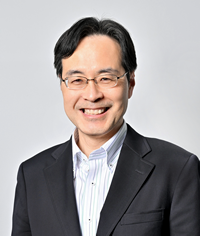I was re-elected as President and will serve as President for another two years. It has been two years of great change for the Japan Neuroscience Society (JNS). I would like to express my deep appreciation for the support and understanding of our members.
The councilor system, introduced as part of the transition to a general incorporated association, was an important step in bringing diverse perspectives to the governance of the JNS. Young and mid-career councilors and members are appointed to various committees, and we are beginning to see a trend toward involving the next generation of members in the JNS. The Board of Directors are elected by the councilors. The election for the councilors is scheduled later this year, and I hope that many members will stand for election and join us in supporting and developing the JNS. Next, we have renewed the contract of the Society's official journal, Neuroscience Research, which has been converted to an open access journal. We have offered a reduced publication fee as a benefit for our society members, so please check our website and actively contribute to the journal. In terms of international collaboration, the Society has strengthened its relationship with many overseas societies and expanded its global network such as IBRO, SfN, China-Japan-Korea (CJK) and FAONS. As a counterpart to many overseas societies, JNS will continue international collaborations and further strengthen the international presence of neuroscience in Japan. The number of members has also reached a record high of approximately 6,400, further strengthening the foundation of the Society's activities. In keeping with the philosophy of "Our Neuroscience Society" that I have mentioned in 2023, I will continue to strive to make the Society valuable to every member and an organization that can truly contribute to the development of neuroscience.
The 48th Annual Meeting of the JNS will be held in Niigata, July 24-27, 2025. Special events are planned to commemorate the 50th anniversary of the foundation of the JNS, and this will be a valuable opportunity to look back at the past and look forward to the future of neuroscience. We hope that many of our members will attend and make this commemorable meeting a great success.
Recently, the research environment has become more difficult, as evidenced by the request for an increase in the KAKENHI and the urgent statement by the Japan Association of National Universities. Due to the gradual decrease in management expense grant to the universities for years, I feel that the KAKENHI has come to play an important role as a basic research fund for researchers. Compared with other fields, the neuroscience field is in a relatively favorable environment, because a wide range of neuroscience research, from basic to clinical, has been supported by large top-down research funds from AMED and other organizations, in addition to bottom-up research funds from KAKENHI. However, in order to maintain and develop this situation, understanding and support from the society are essential.
We regularly hold the events at our annual meeting to discuss the future of neuroscience, the careers of researchers, and the research environment. I hope that our members will think and act together and widely communicate the significance and results of their research to society through outreach and other activities to ensure the future development of neuroscience. I am confident that the bottom-up efforts by each member will deepen public understanding of the importance of neuroscience and lead to the creation of a sustainable research environment. We hope that you will use the 50th anniversary of the JNS as an opportunity to think about the future of neuroscience.





